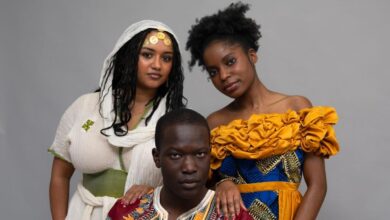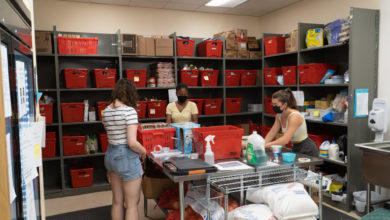Journey Through Time: Celebrating 5 Years of UABSA
Tracing the evolution of advocacy and community among Black students at the University of Alberta.
 Pia Co
Pia CoAs the University of Alberta Black Students’ Association (UABSA) marks five years on campus, its impact should be celebrated by our university community. Since 2018, UABSA has served as a beacon of unity, resilience, and empowerment for Black students. It has fostered a supportive environment where cultural identity is celebrated and voices are amplified. In the spirit of the association’s Gala theme for Black History Month, “Journey Through Time,” we embark on a reflective exploration of UABSA’s legacy. We honour its contributions while acknowledging the rich history of Black student associations on our campus, which dates back decades.
Previous chapters of the Black Students’ Association (BSA) have left a mark on the university’s cultural landscape. In the 1990s, a vibrant and active BSA chapter thrived. Simply put, it provided a space for Black students to come together, share experiences, and advocate for their needs. This association played a pivotal role in fostering a sense of belonging and solidarity among Black students. It served as a hub that affirmed cultural identity. As we reflect on the importance of UABSA and its predecessors, we recognize the significance of Black student associations. These associations have become essential pillars of support and empowerment within our university community.
I recently interviewed Siyani Nsaliwa, a U of A alumn who served as the BSA president in 1996. He reflected on his time at the U of A and gave insight into the challenges faced by Black students in the past. From navigating systemic barriers to confronting stereotypes and prejudice, Nsaliwa spoke of the resilience and determination of the BSA during his tenure. The student group remained steadfast in its commitment to fostering a sense of community and identity among Black students.
The association allowed students to learn about pivotal moments in Black history. Nsaliwa spoke about how the BSA discussed significant events like the “Million Man March in Washington, which was like a follow-up to the Martin Luther King Jr. March in the 60s.” These discussions took place against a backdrop of high tensions within Black communities following the Civil Rights Movement.
While Nsaliwa was an undergrad, Black students in both the United States and Canada were acutely aware of the challenges confronting their communities. The BSA encouraged students to come together and engage in meaningful discussions about social and political issues. Its role in sparking campus discussions of racism and empowerment helped advance conversations that create positive change. Not just for Black students, but for our institution as a whole.
Continuing the conversation on empowerment, the U of A’s engagement with international students underlines the importance of recognizing different cultural backgrounds that shape the Black experience in Canada. The U of A welcomes thousands of international students each year, many of whom face questions of cultural transition and evolving identity. For newcomers like Nsaliwa, the BSA was particularly instrumental in fostering a deeper understanding of what it meant to be Black in North America.
“Coming from Malawi, everyone is Black, so ‘Black’ wasn’t really an identifier,” Nsaliwa said. “When I moved here, I realized that I was assuming this other identity. I’m a ‘Black’ person because everybody would refer to me that way.”
This sentiment underscores the nuanced experiences of Black individuals from diverse cultural backgrounds. It’s also a sentiment that defines the need for spaces where these complexities can be explored and celebrated.
“I sort of went on a personal journey to find out who that is” Nsaliwa said. “When you’re Black in Canada or Black in Edmonton, what is that?”
However, despite its noble intentions, the BSA faced pushback from individuals who did not self-identify as Black. This created a challenge that resonates with the experiences of the UABSA today. As Nsaliwa recounted, “there were tensions surrounding the association’s name.” Some people expressed discomfort with the term ‘Black’ due to its affiliations with militant organizations. Organizations like the Black Panther Party had an assertive and confrontational approach to combating racial injustice. This association with militancy and the negative stereotypes perpetuated by the media made it difficult for the BSA to attract members.
“There was pressure for us to change the name. So we felt like we needed to change it so that we could attract more people. I graduated in 2001. But on my way out, I facilitated the name change from the Black Students’ Association to the Students of African and Caribbean Heritage (SACH),” Nsaliwa said. Over the years, maintaining connections between chapters proved difficult, and by the late 2000s the BSA’s legacy had faded.
The re-establishment of UABSA in 2018 re-ignited the tradition of Black student associations on campus. Under passionate leadership, UABSA has carried on the vital work of advocating for students and fostering community. This is just as the BSA did in decades past. Through impactful events like our annual Black History Month Gala that celebrates Black culture, UABSA leaves an indelible mark. We are proud to be joining the legacies of those who came before us.
The groundwork laid by dedicated past leaders of the BSA helped advance the university’s commitment to equity, diversity, and inclusion for years to come. By establishing a recognized student group as a space for Black students to freely come together, the BSA fostered a stronger sense of representation and cultural understanding. As Nsaliwa noted, one of the most impactful aspects of his involvement was the strong connections built within the Black student community. He recognized that maintaining these alumni networks is vital.
“You become stronger by staying grounded in shared experiences and supporting one another.”
This inward-facing approach has been a cornerstone of the BSA, emphasizing that advocacy stems from a united community. When students unite, their perspectives have more influence.
As the UABSA’s journey continues, it remains committed to empowering its members and celebrating cultural heritage. UABSA continues to follow in the footsteps of its alumni. Through initiatives such as suicide prevention workshops and career development and mentorship programs, the UABSA ensures that its members receive the support they need to thrive academically, professionally, and personally.




